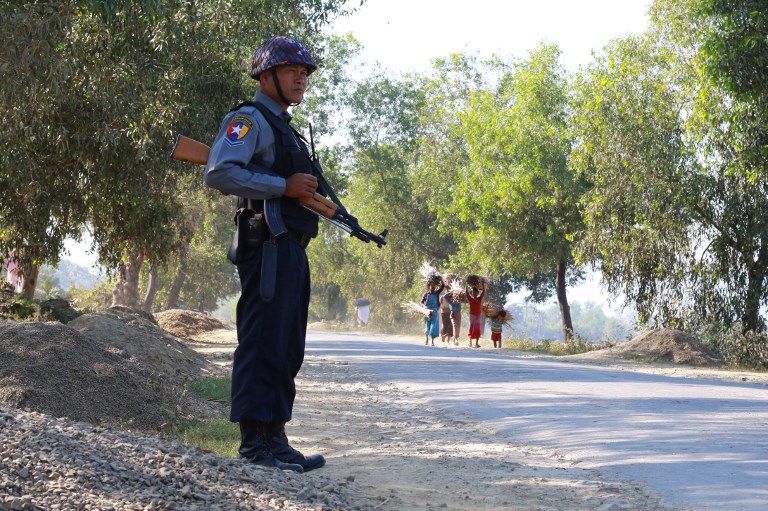Burma’s army-controlled Home Affairs Ministry is investigating a cover-up by the country’s border force of the deaths in custody of two Rohingya Muslims in troubled Arakan State, according to a police report reviewed by Reuters and interviews with two senior security officials.
The internal document is the first official admission of serious wrongdoing by security forces in their crackdown against insurgents in northwestern Burma that has sent more than 70,000 people fleeing across the border to Bangladesh.
When contacted by Reuters, the Home Affairs Ministry denied an investigation was under way, but the commander of the Border Guard Police (BGP) in the area where the incident took place and a senior home ministry security official confirmed the authenticity of the document and said it was not the only such case that was being looked into.
The home ministry oversees the national police force, which includes the BGP. The ministry is headed by an army general.
Burma is under growing international pressure to take action against those who are alleged to have committed atrocities in Arakan. The United Nations has documented mass killings and rapes it says may amount to crimes against humanity.
About 1.1 million Rohingya Muslims live in apartheid-like conditions in northwestern Burma, where they are denied citizenship. Many in Buddhist-majority Burma regard them as illegal immigrants from Bangladesh.
The civilian government led by Nobel laureate Aung San Suu Kyi has repeatedly denied almost all allegations against the country’s still-powerful armed forces during what it has said was a lawful counterinsurgency campaign that began in October.
‘Not telling the truth’
The undated document reviewed by Reuters, titled “A cover-up of two deaths by Border Guard Police,” was compiled by a BGP unit in northern Arakan State and focuses on two men who were arrested on 18 October and questioned on suspicion of aiding insurgents.
The men died in custody, the document says, without specifying a cause of death. Instead of reporting the deaths, it says BGP officers in the village of Nga Khu Ya, in Maungdaw Township, recorded that they had been transferred, with eight others, to another police detention centre.
Thura San Lwin, BGP chief in Maungdaw Township, near the border with Bangladesh, said the document outlining the findings of the investigation had been submitted to police headquarters in the capital Naypyidaw.
“We are taking actions to punish those who lied in their reports. We won’t forgive them. We are also taking actions to punish those who did not follow the rule of law,” he said.
He said two other incidents of BGP officers on the ground “not telling the truth” in reports on the security crackdown were also being investigated by the home ministry.
He declined to provide further details about the nature of those other two incidents, or about the probe into the Nga Khu Ya case.
Contradicting the local commander, Home Affairs Ministry spokesman Police Colonel Myo Thu Soe denied that any BGP officers had lied to conceal the deaths of the two detainees. He said the pair, who were father and son, died from asthma on the way to a hospital on 18 October.
Presidential spokesman Zaw Htay said the government “has instructed the police to look into unreliable reports” during their operation in Arakan State. He declined to elaborate.
Blame game
Phil Robertson, deputy director of Human Rights Watch’s Asia division, said cover-ups of abuses by security forces were common in Burma.
“There are many other cases of abuse that still need to be exposed,” he said, adding that abuses committed by the army were “serious and widespread, and probably dwarf what the BGP committed.”
The army has been in direct control of northern Arakan since early October and drove the sweeping operation there.
The military press bureau did not respond to several requests for comment.
Northwestern Burma has been cut off to aid workers and other independent observers since October.
The military campaign there began after nine BGP officers were killed in attacks on security posts near the Bangladesh border on 9 October. It has renewed international criticism that Burmese leader Suu Kyi has done too little to help the Rohingya Muslim minority.
In a report published earlier this month based on accounts from Rohingyas who had escaped or been released, the UN Office of the High Commissioner for Human Rights described “inhumane conditions and ill-treatment” including rape, torture and deprivation of food and water in various detention centres across northern Arakan.
[related]
The President’s Office, military and police forces have each set up teams to investigate alleged crimes in Arakan after Suu Kyi promised to probe UN allegations of atrocities.
That has set the scene for a behind-the-scenes tussle over who will be held accountable, according to the senior home ministry official and another source with close ties to senior figures in the military.
The person with close military ties said the army and police were “trying to blame each other” for alleged atrocities.
“The military did not expect such a strong response from the international community,” said the source, who is familiar with the thinking of some top generals. “It is now under pressure to investigate.”



